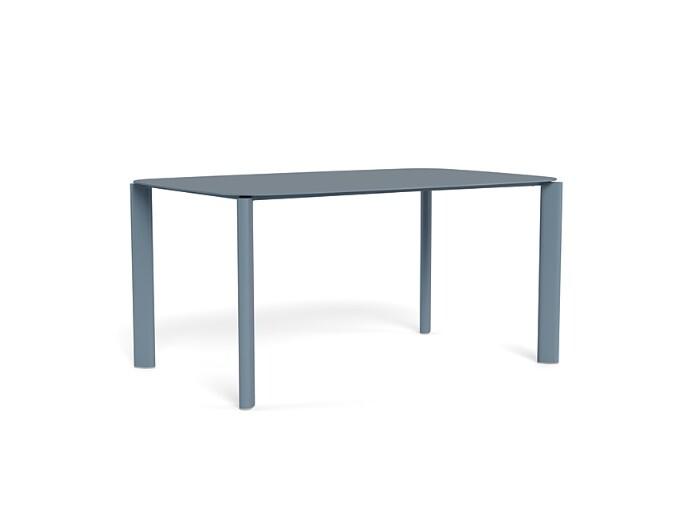Designing For True Inclusivity
On the Contour Table and Accessible Design with Ignacio Ciocchini
Many tables on the market today make claims of wheelchair accessibility, but looking more closely at their specifications, it quickly becomes clear that they just don’t fully comply with the existing Americans with Disabilities Act (ADA) Standards for Accessible Design. The user experience those products offer is considerably lacking in the beauty and quality. Limiting people to a certain angle, a certain end of the table, or even a certain table all together is not the spirit of true inclusivity.
The initial design concept for Contour arose with Ciocchini thinking about ADA regulations and imagining what could be the most minimal, unobtrusive and effective way to design a truly inclusive table if technology had no limits.
Addressing this lack of inclusivity while setting the standard for beauty and durability in ADA compliant site furnishings was the central challenge in the Contour table project–a challenge for which New York City-based industrial designer and accessible design expert, Ignacio Ciocchini was more than well equipped. "Between his work with multiple New York City Business Improvement Districts, his transformational restoration of Midtown Manhattan’s Bryant Park, and his dozens and dozens of ADA integrations all across the city, Ignacio Ciocchini was the perfect match for Contour,” says Landscape Forms Chief Innovation Officer, Kirt Martin. "He knows everything there is to know about ADA compliant design, and his expertise runs throughout every aspect of these tables.”
For Ciocchini, success in this endeavor meant creating a solution that facilitates an elevated yet totally universal user experience.
For Ciocchini, success in this endeavor meant creating a solution that facilitates an elevated yet totally universal user experience. “We focused relentlessly on understanding this problem and the existing regulations, designing for elegance and simplicity, and importantly, ensuring that the experience must be the same for all users—no shortcuts allowed,” the designer says. "This combination led us to create a product line that I believe is one step above any other tables on the market today.”
Contour includes round, gently rounded square and gently rounded rectangular tabletops, each constructed from powdercoated aluminum, and each offered in two different sizes.
The initial design concept for Contour arose with Ciocchini thinking about ADA regulations and imagining what could be the most minimal, unobtrusive and effective way to design a truly inclusive table if technology had no limits. “I thought about a floating surface that is just there hovering on air, without any legs or other obstructions underneath,” he says. "This is not yet possible of course, but it did lead me to the idea of moving the legs outside of the underside of the table surface or right to the very edge of it. This strategy cleared all obstructions and achieved the ADA requirement for an open 30” x 30” x 30” cube under the table surface.”
The second phase of the design process concerned how Contour would interact with its potential surroundings. If the table were impeded in any way by certain site features or environmental factors, its ability to achieve true inclusivity and a universal user experience would be limited. The solution to this challenge was to design not any one singular table, but a platform of modular components that could be assembled in different ways to adapt to different circumstances. Ciocchini describes, "Contour became a system of parts that can be combined to create different ADA inclusive tables—a platform with options to address different needs and environments.”
In its final design, the Contour platform includes round, gently rounded square and gently rounded rectangular tabletops, each constructed from powdercoated aluminum, and each offered in two different sizes. These tabletops are then paired with either four pill-shaped legs that protrude slightly from the edge of the table (the solution inspired by Ciocchini’s ‘impossible table’ thought experiment) or a truncated-cone pedestal that’s sculpted to maximize knee and leg clearance underneath. Across every combination of modular components, every seat at every Contour table is fully compliant with ADA regulations.
By combining Ciocchini’s expertise in accessible design and modular product platforms with Landscape Forms’ durable, public-space-ready construction and high-design, craft manufacturing refinement, Contour foresees a future where true inclusivity is the rule—not the exception—in outdoor space. "In the market today, it’s not easy to go out and find a beautifully designed table like Contour that’s fully ADA compliant. And if you do, it’s probably for the interior and it probably looks a bit clinical,” says Kirt Martin. “We’re changing this model such that a non-disabled person could walk into a space with Contour tables, and they wouldn’t notice any difference. They'd just see a space filled with beautiful, modern tables. However, if you use a wheelchair and you enter this same space, you’ll immediately pick up on the design differences and their purpose will be clear. And I think that’s a really meaningful experience to create."
